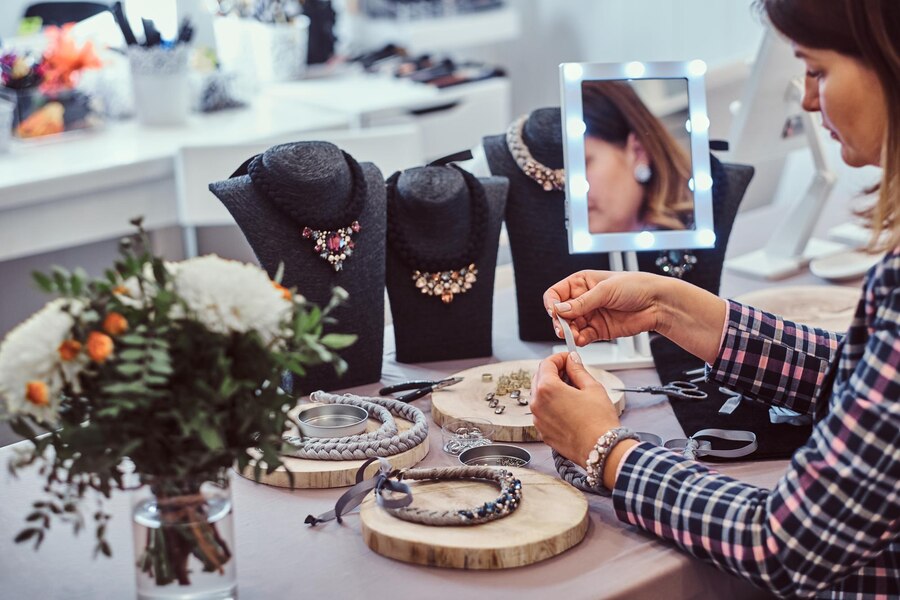The artificial jewellery business is a booming industry with vast potential, especially in countries like India where jewellery plays a crucial role in culture and tradition. With changing fashion trends and the rising demand for affordable yet stylish accessories, starting an artificial jewellery business can be a profitable venture. This guide will walk you through the steps to start your own artificial jewellery business, from planning to execution.
1. Understanding the Artificial Jewellery Market
1.1 Market Research
Before diving into the business, it’s essential to understand the artificial jewellery market. Conducting thorough market research will help you identify:
- Trends: Stay updated with the latest fashion trends in artificial jewellery.
- Target Audience: Identify your target audience, such as young professionals, college students, or middle-aged women.
- Competitors: Analyze your competitors to understand their strengths and weaknesses.
- Pricing Strategies: Research the pricing strategies adopted by competitors to position your products effectively.
1.2 Industry Overview
The artificial jewellery industry has grown significantly over the years. Factors contributing to this growth include:
- Affordability: Artificial jewellery is more affordable than real jewellery, making it accessible to a broader audience.
- Variety: A wide range of designs and styles are available, catering to different tastes and preferences.
- Low Maintenance: Unlike real jewellery, artificial jewellery requires less maintenance and can be easily replaced.
2. Planning Your Artificial Jewellery Business
2.1 Business Model Selection
There are different business models to choose from when starting an artificial jewellery business:
- Online Store: Selling through e-commerce platforms or your own website.
- Physical Store: Setting up a retail store in a strategic location.
- Wholesale: Supplying artificial jewellery to other retailers.
- Dropshipping: Partnering with suppliers who ship products directly to customers.
Choose a business model that aligns with your budget, resources, and goals.
2.2 Business Plan Creation
Creating a detailed business plan is crucial for the success of your venture. Your business plan should include:
- Executive Summary: An overview of your business idea, goals, and vision.
- Market Analysis: Insights from your market research, including target audience and competitor analysis.
- Products and Services: A detailed description of the products you plan to offer.
- Marketing Strategy: Your approach to attracting and retaining customers.
- Financial Projections: Budgeting, pricing strategy, and revenue forecasts.
- Operational Plan: The day-to-day operations of your business, including inventory management, shipping, and customer service.
2.3 Budgeting and Funding
Determine the initial investment required to start your artificial jewellery business. Consider the costs for:
- Inventory: Purchasing or manufacturing jewellery.
- Marketing: Online and offline advertising.
- Website Development: If you’re setting up an online store.
- Rent: If you plan to open a physical store.
- Miscellaneous Expenses: Packaging, shipping, and utilities.
Explore funding options such as personal savings, loans, or investors.
3. Setting Up Your Artificial Jewellery Business
3.1 Legal Formalities and Licensing
Starting a business requires you to comply with legal formalities and obtain the necessary licenses. These may include:
- Business Registration: Register your business name and obtain a trade license.
- GST Registration: Apply for Goods and Services Tax (GST) registration if applicable.
- Trademark Registration: Protect your brand by registering your trademark.
Consult a legal expert to ensure that your business complies with all regulations.
3.2 Choosing a Location
If you’re opening a physical store, choosing the right location is crucial. Consider the following factors:
- Foot Traffic: Choose a location with high foot traffic, such as shopping malls or busy markets.
- Accessibility: Ensure your store is easily accessible to your target audience.
- Competition: Analyze the competition in the area and position your store accordingly.
For an online store, invest in a user-friendly website that provides a seamless shopping experience.
3.3 Sourcing Products
Sourcing high-quality artificial jewellery is essential for the success of your business. You can:
- Partner with Manufacturers: Collaborate with manufacturers who specialize in artificial jewellery.
- Purchase from Wholesalers: Buy in bulk from wholesalers to get better prices.
- Design Your Own Line: If you have a creative flair, design your own jewellery line and have it manufactured.
Ensure that the products you source align with the latest trends and meet the quality expectations of your customers.
4. Building Your Brand
4.1 Brand Identity
Building a strong brand identity is key to differentiating your business in a competitive market. Consider the following:
- Brand Name: Choose a unique and memorable name for your business.
- Logo Design: Invest in a professional logo that reflects your brand’s identity.
- Brand Colors and Fonts: Select colors and fonts that resonate with your target audience.
4.2 Packaging and Presentation
Packaging plays a significant role in enhancing the perceived value of your products. Invest in high-quality packaging that:
- Reflects Your Brand: Use your brand colors and logo on packaging materials.
- Protects the Product: Ensure that the packaging is sturdy and protects the jewellery during transit.
- Is Eco-Friendly: Consider using sustainable materials for packaging to appeal to environmentally conscious customers.
4.3 Online Presence
In today’s digital age, having a strong online presence is essential. Here’s how you can establish your brand online:
- Website: Create a professional website with a user-friendly interface, clear product descriptions, and secure payment options.
- Social Media: Leverage social media platforms like Instagram, Facebook, and Pinterest to showcase your jewellery and engage with your audience.
- SEO: Optimize your website and content for search engines to improve visibility and attract organic traffic.
5. Marketing Your Artificial Jewellery Business
5.1 Digital Marketing
Digital marketing is a cost-effective way to reach a wide audience. Some strategies include:
- Social Media Marketing: Run targeted ads on social media platforms to reach your ideal customers.
- Content Marketing: Create engaging content like blog posts, videos, and tutorials to attract and retain customers.
- Email Marketing: Build an email list and send out newsletters with promotions, new arrivals, and style tips.
5.2 Influencer Marketing
Collaborating with influencers can help you reach a larger audience. Consider partnering with:
- Fashion Bloggers: Fashion influencers who can showcase your jewellery in their outfit posts.
- YouTubers: YouTubers who can review your products and provide styling tips.
- Instagram Influencers: Influencers on Instagram who can create content around your jewellery.
Ensure that the influencers you choose align with your brand values and have a following that matches your target audience.
5.3 Offline Marketing
While digital marketing is essential, don’t overlook offline marketing strategies. These can include:
- Exhibitions and Trade Shows: Participate in jewellery exhibitions and trade shows to showcase your products.
- Pop-Up Stores: Set up pop-up stores in shopping malls or events to reach a new audience.
- Collaborations: Collaborate with fashion designers or boutiques to feature your jewellery in their stores.
5.4 Customer Loyalty Programs
Encourage repeat business by offering customer loyalty programs. These could include:
- Discounts for Repeat Purchases: Offer discounts to customers who make repeat purchases.
- Referral Programs: Encourage customers to refer friends in exchange for discounts or freebies.
- Exclusive Offers: Provide exclusive offers to loyal customers, such as early access to new collections.
6. Managing Your Artificial Jewellery Business
6.1 Inventory Management
Effective inventory management is crucial to avoid stockouts or overstocking. Consider using inventory management software to:
- Track Stock Levels: Keep track of stock levels in real-time to avoid running out of popular items.
- Analyze Sales Data: Use sales data to forecast demand and plan inventory accordingly.
- Automate Reordering: Set up automated reordering for products that are running low in stock.
6.2 Customer Service
Providing excellent customer service is essential to building a loyal customer base. Focus on:
- Responsive Communication: Respond to customer inquiries and complaints promptly.
- Easy Returns and Exchanges: Offer a hassle-free returns and exchanges policy.
- Personalization: Personalize your communication with customers, such as sending personalized thank you notes or offering personalized recommendations.
6.3 Financial Management
Keep a close eye on your finances to ensure the profitability of your business. Consider:
- Accounting Software: Use accounting software to track expenses, revenue, and profits.
- Budgeting: Regularly review and adjust your budget to manage cash flow effectively.
- Tax Compliance: Ensure that you comply with all tax regulations and file returns on time.
7. Scaling Your Artificial Jewellery Business
7.1 Expanding Your Product Line
As your business grows, consider expanding your product line to include:
- New Styles: Introduce new styles and designs to keep your collection fresh and appealing.
- Complementary Products: Offer complementary products like jewellery organizers or cleaning kits.
- Custom Orders: Provide custom jewellery services for special occasions like weddings or events.
7.2 Expanding to New Markets
Explore opportunities to expand your business to new markets. This could involve:
- Selling Internationally: Offer international shipping to reach customers in other countries.
- Opening New Stores: Consider opening additional physical stores in different locations.
- Wholesale Expansion: Expand your wholesale business by partnering with more retailers.
7.3 Franchise Model
If your business is highly successful, consider franchising your brand. A franchise model allows you to:
- Expand Quickly: Expand your business rapidly without the need for large capital investment.
- Earn Royalties: Earn royalties from franchisees for using your brand name and business model.
7.4 Technology Integration
Integrate technology into your business operations to streamline processes and improve efficiency. Consider:
- E-commerce Platforms: Use e-commerce platforms like Shopify or WooCommerce to manage your online store.
- Customer Relationship Management (CRM): Implement CRM software to manage customer relationships and improve customer retention.
- Data Analytics: Use data analytics tools to gain insights into customer behavior and make informed business decisions.
8. Overcoming Challenges in the Artificial Jewellery Business
8.1 Competition
The artificial jewellery market is highly competitive. To stand out, focus on:
- Unique Designs: Offer unique and exclusive designs that are not easily available elsewhere.
- Quality Assurance: Ensure that your jewellery is of high quality to build trust with customers.
- Customer Experience: Provide an exceptional customer experience that keeps customers coming back.
8.2 Keeping Up with Trends
Fashion trends change rapidly, and it’s essential to keep up. Stay ahead by:
- Trend Forecasting: Follow fashion blogs, magazines, and influencers to stay updated with the latest trends.
- Flexible Sourcing: Work with suppliers who can quickly produce new designs to keep up with trends.
- Customer Feedback: Pay attention to customer feedback and preferences to understand what’s in demand.
8.3 Managing Costs
Keeping costs under control is essential to maintain profitability. Focus on:
- Efficient Operations: Streamline your operations to reduce waste and improve efficiency.
- Negotiating with Suppliers: Negotiate better deals with suppliers to reduce the cost of goods.
- Optimizing Marketing Spend: Use data to optimize your marketing spend and focus on channels that provide the best return on investment.
8.4 Building a Brand
Building a strong brand takes time and effort. Focus on:
- Consistent Branding: Maintain consistent branding across all channels, including your website, social media, and packaging.
- Customer Engagement: Engage with your customers regularly through social media, email newsletters, and events.
- Building Trust: Build trust with your customers by delivering high-quality products and excellent customer service.
FAQs
1. How much investment is required to start an artificial jewellery business?
- The investment required can vary depending on the scale of your business. A small online store may require an initial investment of ₹50,000 to ₹1,00,000, while a physical store may require ₹2,00,000 to ₹5,00,000.
2. Is it necessary to have a physical store for selling artificial jewellery?
- No, you can start an artificial jewellery business online without a physical store. However, having a physical presence can help build trust and attract local customers.
3. How can I ensure the quality of the artificial jewellery I sell?
- Source your products from reputable manufacturers and conduct quality checks before adding them to your inventory.
4. What are the best platforms to sell artificial jewellery online?
- Some popular platforms include Amazon, Flipkart, Myntra, and your own e-commerce website.
5. How can I attract customers to my artificial jewellery business?
- Use a combination of digital marketing strategies, including social media marketing, influencer partnerships, and SEO, to attract customers to your business.






